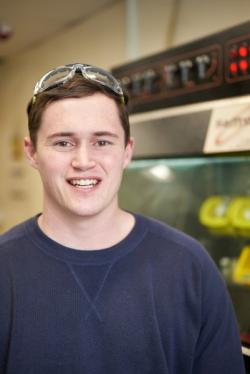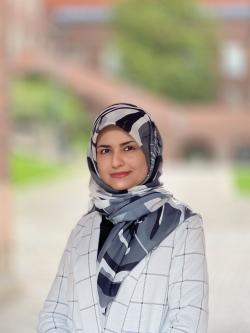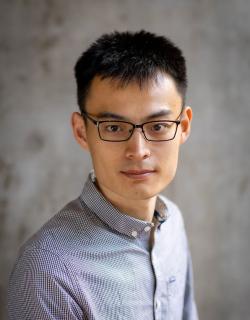2026 Chancellor’s Research Fellows
The University of Technology Sydney (UTS) has unveiled the recipients of the UTS Chancellor's Research Fellowships (CRF) for 2026, spotlighting 14 outstanding researchers set to tackle some of today’s most complex challenges.
These visionary researchers bring forward an inspiring breadth of research, addressing areas from sustainable Indigenous community planning to advanced quantum information processing, each aiming to make a transformative impact.
UTS Interim Pro Vice-Chancellor (Research), Distinguished Professor Alaina Ammit, expressed her enthusiasm for the CRF cohort of 2026.
"I am truly excited to see such a diverse and passionate group join our institution. These fellows are not only pioneering research in their respective fields but are also contributing significantly to addressing global challenges," she said.
"At UTS, we pride ourselves on undertaking world-class research that delivers economic, social, and cultural prosperity in the communities where we live and work."
"The work of this cohort epitomises the forward-thinking, innovative spirit we champion at UTS."
Each fellow will receive a four-year contract appointment, project funding of up to $50,000, and a suite of additional support to advance their research.
Here is a look at some of the groundbreaking projects led by this year’s fellows:
Dr Darren Haywood

Project Title: Improving Mental Health Care for Cancer Survivors: The HiTOP-CANCER Program
Summary: Each year, approximately 600,000 Australians living with or beyond cancer experience mental illness, with suicide rates among survivors elevated by up to 600% compared to the general population. Despite this, psycho-oncology has seen limited evolution in its conceptual frameworks. This project aims to evaluate the clinical utility of the Hierarchical Taxonomy of Psychopathology (HiTOP), a contemporary, empirically derived model for understanding mental health challenges, within psycho-oncology care. By integrating HiTOP into psycho-oncology, the project aims to deliver the most substantial update to the field since its inception, generating the evidence base and practical resources needed for national implementation. Anticipated benefits include improved mental health assessment, improved conceptualisation and communication of psychological challenges, and tailored and data-informed treatment approaches for people affected by cancer.
Sponsor: Professor Nicolas Hart
Dr Nathan Weber
Project Title: Destroying ‘Forever Chemicals’ (PFAS): Modelling, Laboratory Research and Commercial-Scale Studies
Summary: Dr Nathan Weber’s project investigates the thermal decomposition of per- and polyfluoroalkyl substances (PFAS) under real-world treatment conditions by analysing emissions from high-temperature laboratory experiments, commercial-scale facilities, and chemically complex environments. Using advanced analytical techniques, quantum chemical modelling, and field validation, the research will uncover how PFAS behave during thermal treatment and identify hazardous byproducts that may form. Expected outcomes include detailed kinetic profiles, insights into decomposition pathways, and an improved understanding of PFAS behaviour in complex matrices. The project will inform regulatory frameworks, support safer industrial practices, reduce environmental and health risks, and strengthen UTS’s leadership in environmental contamination and PFAS destruction research.
Sponsor: Professor Eric Kennedy
Dr Piyush Punetha

Project Title: Next Generation, Sustainable Infrastructure Protection System using Geo-Stabilised Recycled Waste
Summary: This project aims to develop an innovative and sustainable infrastructure protection system using recycled waste stabilised with 3D-printed cellular geoinclusions to mitigate bushfire-induced damage to transport corridors. It will generate new knowledge on the impact of bushfires on transport infrastructure and create a new application area for recycled waste. The main outcome is an experimentally and computationally verified solution to safeguard transport corridors in bushfire-prone areas. By diverting waste away from landfills and transforming it into a resource for developing climate-adaptive infrastructure, this project supports the Australian Government’s goals of achieving a net-zero future and building a secure and resilient nation.
Sponsor: Associate Professor Sanjay Nimbalkar
Dr Matthew Joseph Evans

Project Title: Green Bismuth Catalysts for the Hydrogen Economy
Summary: This project aims to devise a sustainable, non-toxic and state-of-the-art approach to developing environmentally benign bismuth catalysts for hydrogen production within Australia. Current industrial approaches for the generation of hydrogen rely primarily upon the steam-reforming of methane, a process that is responsible for significant global greenhouse gas emissions. This project supports UTS sustainable energy research strategies by using redox flexible bismuth systems in catalytic hydrogen evolution reactions from regenerable feedstocks. The outcomes of this project will strongly enhance Australia’s mission to establish effective and lucrative hydrogen production technologies to support the wider hydrogen roadmap.
Sponsor: Professor Steven Langford
Dr Angus Mitchell

Project Title: How can we climate-proof our estuarine fisheries?
Summary: This project aims to climate-proof Australia’s estuarine fisheries by assessing whether fish populations can adapt to intensifying climate stressors such asmarine heatwaves and deoxygenation. Strong selective pressures in climatically extreme estuaries may have already driven the evolution of climate-resilient fish populations. By identifying these populations and testing whether their resilience traits are heritable or plastic, this project will reveal the pre-existing adaptive potential of estuarine fishes to climate change. Leveraging these findings through evolutionary rescue and assisted gene flow willdeliver actionable strategies to safeguard estuarine fishes, preserve sustainable seafood production and inform fisheries management.
Sponsor: Professor David Booth
Dr Sabrina Chakori

Project Title: Exnovation for sustainability: catalysing just transitions
Summary: Urgent action is needed to address the current socio-ecological poly-crisis. How to unlock transformational change remains a core question in sustainability transition studies. Socio-technical responses to sustainability challenges often focus on innovation; less attention has been devoted to ‘exnovation’- the deliberate phase-out of unsustainable products, business models, institutional logics or socio-economic systems. Businesses play a vital role in these complex transitions, yet Small and Medium Enterprises (SMEs) remain neglected in transition pathways. Thus, this inter- and trans-disciplinary project explores how policymakers and SMEs navigate challenges and opportunities to sustainability exnovation policies in food systems, the circular economy and in other key transition areas. This project examines institutional and governance arrangements that support equitable sustainability transitions. It contributed to the knowledge of transition governance by strengthening transition policy coherence and actions, also helping navigate contested areas. Exnovation could help foster transformation towards sustainable societies by addressing ‘lock-ins’ and the inertia of the existing system.
Sponsor: Professor Chris Riedy
Dr Yuan Feng

Project Title: Next-generation climate resilient design of energy infrastructure
Summary: This fellowship project aims to develop a climate resilience-based design for energy infrastructure systems. In Australia, the growing demand of new infrastructure faces a major threat from natural disaster costs which will exceed $39B by 2050 unless proactive measures are adopted. This project will develop a framework that integrates multiple hazard impacts, time-dependent resilience, and climate adaptive design for energy infrastructure. Expected outcomes include new performance criteria for climate resilient design, laying the foundation for new generation renewable energy strategies. This project will benefit Australian energy infrastructure with unique tools to assess system resilience, optimize design, and enhance sustainability and reliability.
Sponsor: Distinguished Professor Mark Stewart
Dr Lisa Ewenson

Project Title: Older Women’s Housing Precarity, Climate Change and Disaster: Reform through a Relational Rights-Based Approach
Summary: This research focuses on older women in Australia who are the fastest growing cohort facing housing precarity and homelessness, an issue worsened by climate change, including through climate-accelerated disasters. In this context of national urgency, and to understand the structural and systemic drivers of this crisis, this project will be informed by the life-course histories of older women who have experienced climate change-impacted housing precarity. Achieving the right to adequate housing is fundamental to leading a life of dignity. This research innovatively focuses on the underpinning political, economic, social, environmental and legal structures which longitudinally shape the domain of housing as a profound driver of gendered inequality across our nation. This project will influence legislative and policy reform to transform the housing ecosystem in Australia, centring the realities of older women who have endured precarious housing arrangements. How we relate to each other characterises the quality of our democracy, and a care-based social democracy is a sustainable alternative to the neoliberal processes currently dominant in Australia. In applying a relational rights-based framework to housing, this research not only provides a novel theoretical framework, it will provide a road map to implement a relational-rights based approach to housing in this era of climate change and increasing disasters.
Sponsor: Professor Jessie Hohmann
Dr Parisa Ramezani

Project Title: Multi-Functional Network Co-Design for Energy-Efficient 6G Systems
Summary: This project aims to revisit how next-generation wireless networks are built and run, with sustainability at the core. We will design new models, algorithms and architectures that make future systems not only high-performing, but also resource-efficient, guided by the five “R” principles: Reduce, Reuse, Recycle, Repurpose and Refuse. By unifying multiple network functions in a single, coherent framework, the research aims to cut energy use, minimise extra hardware, and use existing resources more intelligently. The expected outcome is a set of enabling technologies that support a net-zero wireless ecosystem and make sure tomorrow’s networks deliver greater performance with a smaller environmental footprint.
Sponsor: Professor Tuan Hoang
Dr Lin Zhu

Project Title: From Real-World Data to Real-World Evidence: Enhancing Analytic Methods for Target Trial Emulation
Summary: This project aims to advance methods for transforming real-world health data into high-quality evidence that informs clinical practice and health policy. By enhancing target trial emulation, a causal inference approach that frames analyses of observational data to mimic randomized controlled trials, the research will help minimise common sources of bias in observational studies. The methods will be applied to large-scale Australian registry and health datasets to generate robust evidence on treatment effectiveness. The project will also develop open resources and analytic tools to support researchers and clinicians in adopting these methods and strengthening the role of real-world evidence in healthcare.
Sponsor: Associate Professor Kris Rogers
Dr Xingjian Zhang

Project Title: Theory and Applications for Reliable Quantum Networks
Summary: The project “Reliable Information Processing: Harnessing Quantum Physics for Next-Generation Networks” aims to develop novel approaches for establishing and utilising a reliable quantum internet. By integrating concepts in information theory and quantum mechanics, the research seeks to advance knowledge and methodologies in quantum information processing. Leveraging the most distinguishing quantum resource—nonlocality, or quantum correlations unexplainable by classical physics—the project will develop new analyses and protocols for device-independent communication, whose reliability relies solely on the validity of quantum theory, and verification methods for quantum shallow circuit computation without intractable assumptions. The project shall contribute to a practical quantum software network in Australia, accelerating translating quantum technologies into real-world applications.
Sponsor: Professor Mingsheng Ying
Dr Thi Minh Hong Nguyen

Project Title: Unravelling Brain Entry and Neurotoxicity of Emerging Environmental Toxins
Summary: This project addresses a critical gap in environmental health: how emerging contaminants threaten brain function and contribute to neurodegenerative disease. Current risk frameworks overlook the brain, leaving regulators unprepared for rising health and sustainability challenges. By integrating environmental science, biotechnology, and advanced data modelling, this fellowship will generate transformative insights and establish the foundation for next-generation risk assessment. Outcomes include high-impact research, evidence to inform regulation, and interdisciplinary training for future leaders. Aligned with national priorities in health, resilience, and environment, the project positions UTS at the forefront of innovative, impact-driven science with tangible global benefit.
Sponsor: Associate Professor David Bishop
Dr Yanan Xu

Project Title: Toward reliable AM of FRP structures: an optimisation approach under risk and uncertainties
Summary: This project aims to create a robust design framework for 3D-printed fibre-reinforced polymer composite structures, addressing the impact of defects and uncertainties on structural reliability. Integrating micro-CT-informed multiscale modelling, optimisation under uncertainty, machine learning acceleration, and experimental validation, the research will deliver lightweight, defect-tolerant structures. The outcomes will advance fundamental knowledge in composite optimisation and provide a transferable methodology that can be applied to a wide range of emerging advanced manufacturing technologies.
Sponsor: Professor Sarah Zhang
Dr Huan Liu
Project Title: Harnessing Human Waste–Driven Microbial Control for Sustainable Wastewater Treatment
Summary: This project aims to develop a novel technology for microbial control to achieve sustainable wastewater treatment by enhancing the performance of both biological wastewater and sludge treatment. This technology is supported by my ground-breaking scientific discoveries. The expected outcomes include reduced treatment costs, improved water quality, and safer biosolids, offering economic, environmental, and social benefits for the water industry and the broader Australian community.
Sponsor: Professor Qilin Wang


